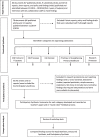Producing knowledge together: a participatory approach to synthesising research across a large-scale collaboration in Aboriginal and Torres Strait Islander health
- PMID: 38172892
- PMCID: PMC10765661
- DOI: 10.1186/s12961-023-01087-2
Producing knowledge together: a participatory approach to synthesising research across a large-scale collaboration in Aboriginal and Torres Strait Islander health
Abstract
Background: Despite that stakeholder participation in evidence synthesis could result in more useful outcomes, there are few examples of processes that actively involve them in synthesis work. Techniques are needed that engage diverse stakeholders as equal partners in knowledge co-production. The aims of this paper are to describe an innovative participatory process of synthesising a large body of academic research products and compare the findings of the participatory process against two traditional approaches to synthesis: a rapid review and a structured review.
Methods: First, a rapid synthesis of all research outputs (n = 86) was conducted by researchers with in-depth knowledge of the collaboration's research. Second, a team of researchers and service providers conducted a structured synthesis of seventy-eight peer-reviewed articles and reports generated by the collaboration. Fifty-five publications were brought forward for further synthesis in part three, a facilitated participatory synthesis. Finally, we explored the value added by the participatory method by comparing findings generated across the three synthesis approaches.
Results: Twelve researchers and 11 service providers/policy partners-8 self-identified as Aboriginal and/or Torres Strait Islander-participated in two facilitated workshops (totalling 4 h). Workshop activities engaged participants in reviewing publication summaries, identifying key findings, and evoked review, discussion and refinement. The process explicitly linked experiential knowledge to citations of academic research, clearly connecting the two knowledge types. In comparing the findings generated across all three methods we found mostly consistencies; the few discrepancies did not contradict but gave deeper insights into statements created by the other methods. The participatory synthesis generated the most, detailed, and unique findings, and contextual insights about the relevance of the key messages for practice.
Conclusion: The participatory synthesis engaged stakeholders with diverse backgrounds and skillsets in synthesising a large body of evidence in a relatively short time. The participatory approach produced findings comparable to traditional synthesis methods while extending knowledge and identifying lessons most relevant for the participants who, ultimately, are the end users of the research. This process will interest other large-scale research collaborations seeking to engage stakeholders in evidence synthesis.
Keywords: Co-production; Collaboration; Continuous quality improvement; Evidence review; Indigenous health; Knowledge translation; Participatory research; Rapid synthesis; Synthesis; Systems thinking.
© 2023. The Author(s).
Conflict of interest statement
The authors declare that this research was conducted in the absence of any commercial or financial relationships that could be construed as a potential conflict of interest.
Figures
References
-
- National Institute for Health Research. Going the extra mile: Improving the nation's health and wellbeing through public involvement in research. 2015. https://www.nihr.ac.uk/documents/about-us/our-contribution-to-research/h.... Accessed 27 Apr 2023.
-
- Green LW, George MA, Daniel M, Frankish CJ, Herbert CP, Bowie WR, et al. Study of participatory research in health promotion: review and recommendations for the development of participatory research in health promotion in Canada. Ottawa: Royal Society of Canada; 1995.
Publication types
MeSH terms
Grants and funding
LinkOut - more resources
Full Text Sources



